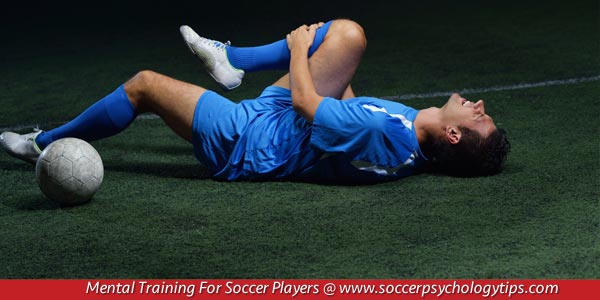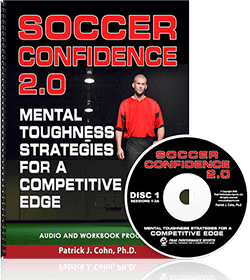
Regaining Confidence After Injuries
Injuries can create major psychological challenges for soccer players. Particularly when your trainer has given you the green light and you are ready to get back to playing.
Even after a soccer player recovers fully from an injury, “mental scars” remain for some players. The biggest fear for athletes who return to their sport is the fear of re-injury.
This fear can cause soccer players to play tentatively, safe, and shy away from hard challenges. We all know that trying to avoid injury actually increases the chance of getting hurt again.
The more you worry and doubt your abilities when returning to soccer, the worse you will likely feel. The good news is you have control of what you focus on.
The key is to reframe thoughts that are impacting your performance.
Reframing is about challenging negative beliefs and changing the way we think about your injury. The goal is to think more rationally about your fears in order to reduce emotional impact and help you feel more confident.
The goal is to feel confident when you return to competition.
When we interviewed, Chip Vaughn, defensive back from the Indianapolis colts, he described how he has dealt with multiple injuries. He said that he tries to put any thoughts of his injury out of his mind.
“If you just tell your mind that no, I’m not going to let it stop me, it really just becomes mind over matter, mind over matter. That’s all it is, saying to yourself this doesn’t hurt, I know what my ultimate goal is, and you can’t let anything stop you, and so the pain just kind of evaporates, it doesn’t even hurt.”
To listen to the entire interview with Chip Vaughn on the psychology of injury, become a member of Peaksports Network and access over 600 pages of sport psychology info including articles, e-books, and expert interviews
Here are three ways you can put fear of re-injury aside and play with intensity:
- One way to cope with the fear of reinjury is that you focus on your strengths and capabilities rather than trying to AVOID reinjury. You do this by focusing more on what is important to your performance, such as putting pressure on the defense or possessing the ball.
- You also need to learn how to cut off any doubts before they sabotage your confidence. This requires being able to recognize when you are experiencing doubts and have a strategy to turn it around before the doubts undermine confidence.
- Before a game or practice, you might visualize (or feel) yourself playing effortlessly with no pain, just like you felt prior to your injury.
If you play soccer, injuries can happen. Every athlete who gets injured needs time to heal and be 100% physically, particularly if you have been out for a while.
It is important that you avoid expectations that you will return and be in the same shape you were preinjury right away. Be patient and tell yourself that you will return and play at the same level you did preinjury.
Download our free e-book, “7 Mental Game Challenges that Block Soccer Player’s Success”, and learn how to overcome other mental game barriers soccer players face.
Related Sports Psychology Articles
- How to Cope with The Mental Scars After Injury
- How to Manage a Long-Term Soccer Injury
- Returning to Soccer after Injury
- Subscribe to The Sports Psychology Podcast on iTunes
- Subscribe to The Sports Psychology Podcast on Spotify
Download a free sports psychology report to improve your mental game!
Learn more about our one-on-one mental game coaching.
Boost Confidence in Soccer

“Soccer Confidence 2.0” 3-CD and Workbook program is the most comprehensive mental game program we’ve offered to the public. We’re virtually giving away all our mental game secrets for the incredibly low price of only $197.00 including the free bonuses!
“Soccer Confidence” is a complete brain dump of the TOP NINE mental training sessions we teach our soccer players to help them boost their mental game and improve consistency – from how to mentally prepare for games to performing under pressure to building unstoppable confidence.
